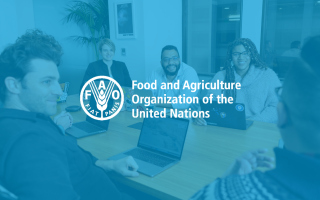Project Management Professional (PMP) Certification Path (Spring Edition - Online)
This online learning course equips participants with core and advanced project management competencies and prepares them for the PMP® certification exam. The course builds skills in planning, execution, risk management, and agile methodologies and provides support, practical activities and useful examples to help participants apply these skills in their daily work.
As the United Nations (UN) marks its 80th anniversary and reflects on how it must evolve to meet global challenges, the need for strong project management capabilities across the UN system has never been greater. To advance progress towards the 2030 Agenda and the Sustainable Development Goals, this course - offered in collaboration with the Project Management Institute (PMI)® - equips participants with practical tools and techniques aligned with PMI standards to deliver impactful, results-oriented projects. While the PMP® exam is optional and not included, the course fully prepares participants to sit for it.
Upon successful completion of this course, participants will be able to:
- Describe basic concepts and principles of project management.
- Recognise different styles of influence and adopt different approaches in order to increase influence with their team and stakeholders.
- Identify the preparatory steps for any type of project and define clear project goals.
- Identify and assess the risks involved in project management, by performing qualitative risk analysis and planning risk responses.
- Develop effective communication skills to allow accurate project status reporting and project closing.
This six-week course is delivered fully online and combines synchronous and asynchronous learning components.
The course provides the 35 contact hours required for PMP® certification eligibility.
The synchronous elements include weekly instructor-led webinars on Zoom, facilitated by a course instructor. These sessions take place twice per week from 2:00 p.m. to 5:00 p.m. (CET) and provide opportunities for direct interaction, discussion, and guided learning. Participants need a computer (or mobile device), a reliable internet connection, and a headset with a microphone or telephone connection for audio. We recommend using computer audio for optimal sound quality. No special software is required, but participants must be able to access Zoom. Instructions for access will be sent to registered participants, and we recommend testing access in advance.
The asynchronous components include self-paced study, discussion forums, and group activities on the UNSSC learning platform. These elements are available throughout the course, allowing participants to engage with content and peers at their own pace while respecting the overall course timeline. On average, participants should plan to dedicate at least two hours per week for self-paced learning, assignments, and course activities on the platform. The exact amount of time may vary depending on individual learning styles and engagement preferences.
The course covers the following topics:
- Project Management Essentials (10 hours)
Project Management Essentials part is a practical way to get a head-start on the certification preparation - it provides practical insights and teaching on topics such as Initiating a Project, Project Charters, Work Breakdown Structures, the People Side of Project Management, Critical Path, Risk Management, and more.
- Key Concepts of Project Management
In this session, we cover key concepts that are relevant, regardless of the types of projects you work on or your level in the organisation. Also, we will talk about the people side of project management. We will discuss how recognising different styles and modifying our approach accordingly can significantly help us influence our project sponsor, team, and stakeholders.
- Project Planning
It can be tempting to just start working on a project without doing sufficient planning. At the same time, we don't want to excessively analyse at the beginning of the project cycle. How can we best start a project with momentum while avoiding the paralysing effects of over-analysing? This session examines best practices for initiating and planning a project.
- Work Breakdown Structure and Planning Tools
Projects almost always require more work than originally anticipated. This session focuses on how to more fully understand all the work that is required for a project. We also discuss techniques and concepts to help you develop more accurate estimates.
- Project Risks and Contingency Planning
Every project has dependencies and risks that must be considered in order to successfully manage expectations and deliver successfully. This session discusses best practices in scheduling and risk management. We also have a practical discussion about the critical path, including what it is and how it can help you stay on track.
- Project Status Reporting and Project Closing
As projects continue towards completion, it is important to keep people up-to-date with the project status. In this session, we will discuss some of the important lessons in project status reporting and project closing. We will also talk about the challenges and opportunities in creating a culture of project delivery.
- Advanced Project Management (14 hours)
Advanced Project Management part combines nuts-and-bolts theory and practical lessons learned, all packaged in a fast-paced, highly interactive session to get you and your organisation on track to consistently deliver successful projects. This part will help you understand some of the more challenging exam areas, such as Cost Management (including earned value), Procurement Management, and Quality Management.
- PMP® Exam Preparation (7 hours)
The PMP® Exam Preparation is focused specifically on passing the PMP® or CAPM® exams. It applies what you learned in the Project Management Essentials and Advanced Project Management parts in order to prepare you to pass the examinations. The PMP® Exam Preparation includes a copy of one of the top exam prep study guides.
- Foundations of Agile Project Management (4 hours)
The Foundations of Agile Project Management is an introduction to agile project management. Agile has quickly become the go-to project management approach for a wide range of industries. In this part, you will be introduced to agile project management, including the core values and principles outlined by the Agile Manifesto. This highly interactive session discusses common myths and misconceptions about agile approaches, identifies factors to consider when deciding whether to adopt agile practices, and helps you apply what you learn.
This course provides you with the 35 hours of formal training needed to apply for the PMP® or CAPM® certification exams. This offer benefits participants looking to get certified in the near term.
UN professional staff at headquarters and field locations with responsibilities in project design, management, and/or reporting and personnel of UN partner organisations.
This course can also be run as in-house/on-site training for an individual agency on demand – please get in touch with us for additional details and pricing.
The course fee of $2,750 covers full participation in the online course. The fee does not cover eventual costs related to the PMP certification exam fee.




